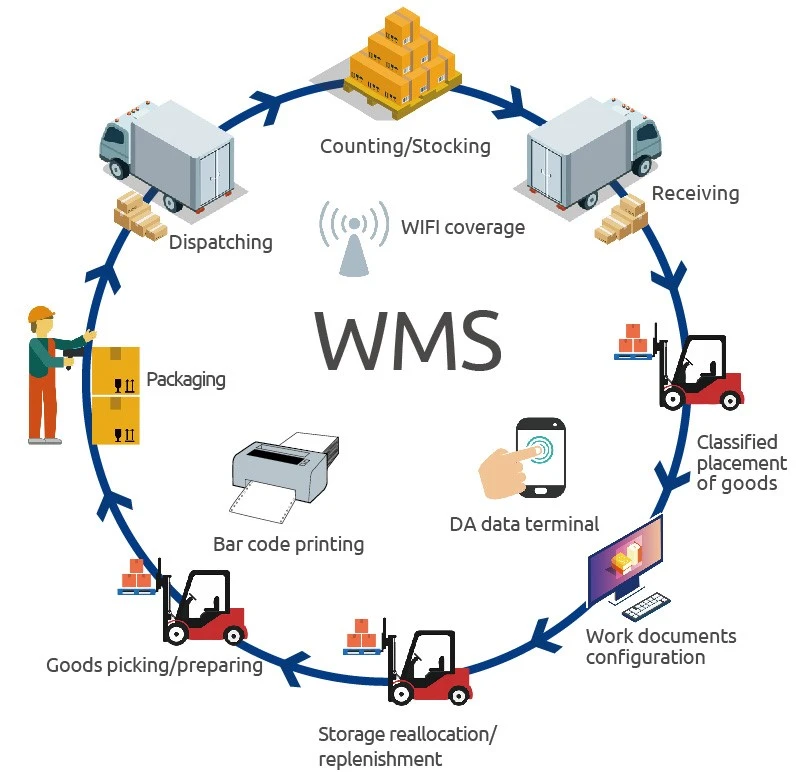
A Warehouse
Management System (WMS) is a crucial software solution that helps
businesses manage and optimize their warehouse operations. It provides
visibility into the entire inventory and helps streamline processes from the
moment goods and materials enter the warehouse until they are shipped out. By
using a WMS, companies can improve efficiency, reduce costs, and enhance
customer satisfaction.
In today's competitive
market, choosing the right WMS is essential. While many solutions are
available, some stand out due to their robust features, scalability, and
industry-specific capabilities. This article will explore some of the top
examples of WMS software, highlighting their unique strengths and applications.
1. Oracle NetSuite WMS
Oracle NetSuite WMS is a
powerful, cloud-based solution that is an integral part of the broader NetSuite
ERP platform. It's particularly well-suited for businesses that need to
manage complex warehouse operations alongside their other business functions,
such as financials, sales, and e-commerce.
Key Features &
Strengths:
Oracle NetSuite WMS is a
great choice for growing e-commerce businesses and wholesalers who
need an end-to-end solution that can scale with their operations.
2. SAP Extended Warehouse Management (EWM)
SAP EWM is a highly
sophisticated and comprehensive WMS solution designed for large, complex
warehouse environments. It's often used by global enterprises and businesses
with intricate supply chains.
Key Features &
Strengths:
SAP EWM is the go-to
choice for Fortune 500 companies, automotive manufacturers,
and pharmaceutical distributors that require a robust and
feature-rich system to manage their complex logistics.
3. Manhattan Associates WMS
Manhattan Associates is
a leader in the supply chain and logistics software space. Their WMS is a
modular and flexible solution that caters to various industries, from retail to
third-party logistics (3PL).
Key Features &
Strengths:
This WMS is a top
contender for retailers, 3PL providers, and e-commerce
giants that need a flexible, high-performance system to handle peak
seasons and complex fulfillment processes.
4. Blue Yonder WMS (formerly JDA Software)
Blue Yonder, another key
player in the supply chain space, offers a WMS known for its ability to create
a unified, end-to-end supply chain. It's particularly strong in demand
forecasting and inventory optimization.
Key Features &
Strengths:
Blue Yonder WMS is a
great fit for companies in the consumer goods (CPG), grocery,
and high-tech industries that need to manage complex, volatile
supply chains.
5. Fishbowl Warehouse
Fishbowl is a popular
choice for small to medium-sized businesses (SMBs), especially
those using QuickBooks. It's a more affordable and user-friendly
option that provides essential WMS functionality without the complexity of
enterprise-level systems.
Key Features &
Strengths:
Fishbowl Warehouse is a
smart choice for SMBs, start-ups, and small-scale
manufacturers looking for an entry-level WMS that provides immediate
value and integrates with their existing accounting software.
When selecting a WMS,
there is no one-size-fits-all solution. The best system for your business will
depend on several factors, including:
By evaluating these
factors and exploring the examples discussed above, you can make an informed
decision that will significantly improve your warehouse efficiency and
contribute to your business's overall success.
| Price: | 80320 |
| Categories: | Services / Construction Services |
| Phone: | +94 711255861 |
| Address: | 1st cross rd |
| Email: | skysolshehara@gmail.com |